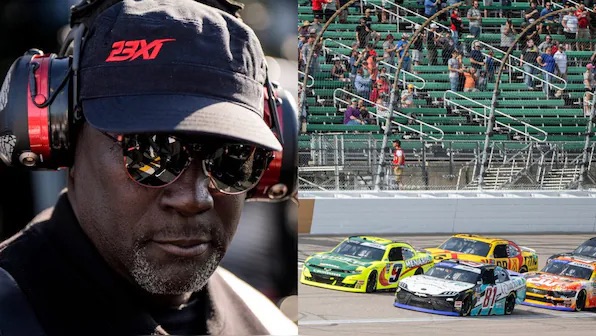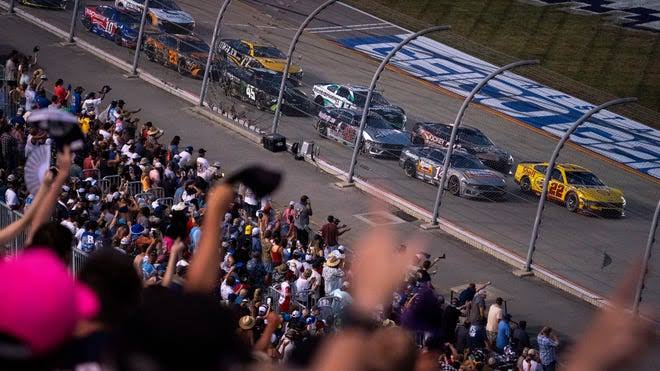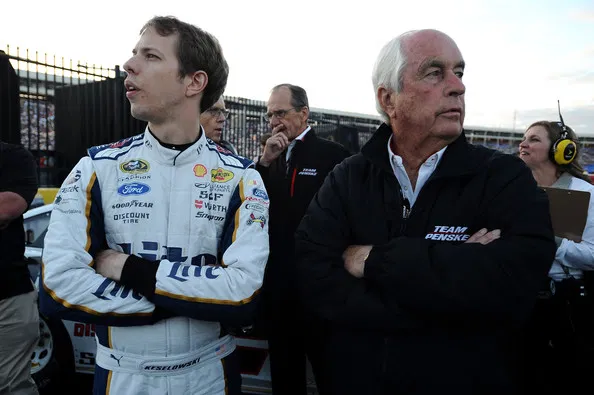Michael Jordan’s foray into the world of NASCAR took a sharp and unexpected turn recently when his team, 23XI Racing, filed an antitrust lawsuit against NASCAR, one of the most prominent auto racing organizations in the United States. This legal move has sent shockwaves through the motorsport world, drawing attention not only because of Jordan’s stature but also because of the broader implications it could have for the future of NASCAR’s business model. The lawsuit, filed in conjunction with another team, Front Row Motorsports, challenges NASCAR’s current revenue-sharing system and the restrictive structure of its charter system.
Michael Jordan, widely recognized as one of the greatest basketball players in history due to his six NBA championships with the Chicago Bulls, has gradually expanded his involvement in sports ownership. Jordan entered the NASCAR scene in 2020 when he launched 23XI Racing, a team named after his iconic jersey number 23 and co-owned by Denny Hamlin, a seasoned NASCAR driver. The team’s entry brought heightened visibility to the sport, as Jordan’s name attracted attention from fans and sponsors alike. However, behind the scenes, not everything has been smooth sailing for Jordan and his racing team.
At the heart of the lawsuit is the controversial charter system introduced by NASCAR in 2016. The system was designed to provide stability to race teams by giving them guaranteed entry into races, along with a fixed share of revenues. A charter essentially operates like a franchise, providing team owners with the assurance that their investment in NASCAR would come with certain rights and protections. In theory, it sounded like a win-win scenario for both NASCAR and the teams: NASCAR would get consistency, while the teams would benefit from financial stability and participation security.
However, as the years passed, many teams, including Jordan’s 23XI Racing and Front Row Motorsports, began to express dissatisfaction with how the charter system actually functioned. The main point of contention centers around the revenue-sharing model, which the teams claim is unfair and overly restrictive. Under the current model, NASCAR teams are entitled to a share of the revenue generated from race events, but the lawsuit argues that NASCAR’s system favors the organization and its tracks at the expense of the teams. This revenue imbalance, according to Jordan’s team, stifles competition and makes it difficult for smaller or newer teams to thrive.
In their lawsuit, 23XI Racing and Front Row Motorsports assert that NASCAR’s system violates U.S. antitrust laws by creating an environment where teams are bound too tightly to the series. They argue that the charter system effectively limits their autonomy by dictating not only which tracks they race on but also the suppliers they must use for equipment and services. This, the teams claim, suppresses competition within the sport, preventing teams from seeking more advantageous deals or choosing where and how they want to race.
The lawsuit also targets NASCAR’s chairman, Jim France, who has been instrumental in shaping the modern structure of the organization. The legal challenge questions France’s role in maintaining what the plaintiffs see as an unfair system, suggesting that his leadership has prioritized the interests of the organization over those of the individual teams. By focusing on these claims, Jordan’s 23XI Racing is effectively calling for a fundamental change in how NASCAR is run, one that would give teams more flexibility and, importantly, a larger piece of the financial pie.
This isn’t just a financial battle, though—it’s about the very structure of NASCAR’s ecosystem. Racing teams are at the core of the sport, and their performance and viability are essential to keeping the sport competitive and engaging for fans. If the teams feel financially suffocated, it could lead to fewer teams being able to compete at a high level, which would ultimately hurt NASCAR’s reputation and fan appeal.
Jordan’s involvement adds an additional layer of intrigue to this case. As someone who has successfully navigated both the business world and professional sports, his influence could sway public perception about the fairness of NASCAR’s system. Jordan is no stranger to the courtroom, having been involved in legal disputes throughout his career as a businessman and athlete. His decision to take NASCAR to court is likely not just about his own team’s interests but about setting a precedent for the sport as a whole. By joining forces with Front Row Motorsports, Jordan is sending a message that this fight isn’t just about 23XI Racing but about all NASCAR teams who feel burdened by the current system.
The timing of this lawsuit is also noteworthy, as it comes at a moment when NASCAR is trying to broaden its appeal to new audiences. The sport has made significant efforts in recent years to diversify its fan base, attract new sponsors, and modernize its image. Michael Jordan’s presence in the sport has been a key part of that strategy, bringing attention from non-traditional NASCAR fans and generating excitement around 23XI Racing. However, this lawsuit threatens to disrupt NASCAR’s carefully crafted narrative of growth and inclusivity. If the legal dispute drags on or results in major changes to the charter system, it could cause uncertainty in the sport and disrupt relationships with sponsors and broadcasters.
What happens next is anyone’s guess. If the court sides with Jordan and Front Row Motorsports, it could result in sweeping changes to how NASCAR operates, potentially giving teams more independence and a greater share of the revenue. On the other hand, if NASCAR successfully defends its current system, it could reinforce the status quo and leave teams with little recourse but to continue operating within the confines of the charter model.
Regardless of the outcome, Michael Jordan’s decision to challenge NASCAR in court marks a pivotal moment for the sport. With one of the greatest athletes of all time now leading the charge for change, the future of NASCAR’s revenue-sharing and charter system could be on the verge of a major overhaul. As the lawsuit unfolds, all eyes will be on whether Jordan’s legal gamble pays off and reshapes the sport of NASCAR.




